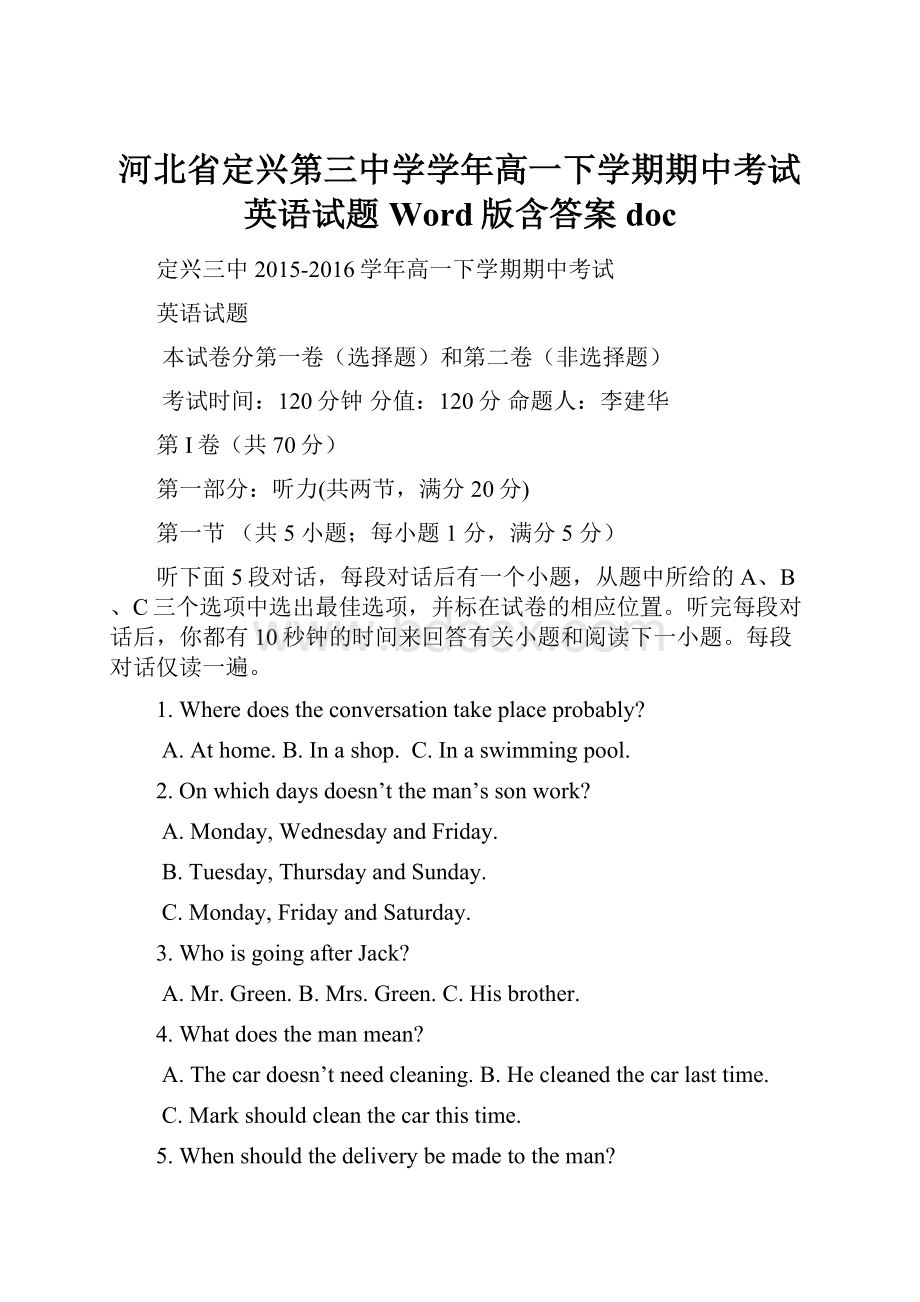河北省定兴第三中学学年高一下学期期中考试英语试题 Word版含答案doc.docx
《河北省定兴第三中学学年高一下学期期中考试英语试题 Word版含答案doc.docx》由会员分享,可在线阅读,更多相关《河北省定兴第三中学学年高一下学期期中考试英语试题 Word版含答案doc.docx(21页珍藏版)》请在冰豆网上搜索。

河北省定兴第三中学学年高一下学期期中考试英语试题Word版含答案doc
定兴三中2015-2016学年高一下学期期中考试
英语试题
本试卷分第一卷(选择题)和第二卷(非选择题)
考试时间:
120分钟分值:
120分命题人:
李建华
第I卷(共70分)
第一部分:
听力(共两节,满分20分)
第一节(共5小题;每小题1分,满分5分)
听下面5段对话,每段对话后有一个小题,从题中所给的A、B、C三个选项中选出最佳选项,并标在试卷的相应位置。
听完每段对话后,你都有10秒钟的时间来回答有关小题和阅读下一小题。
每段对话仅读一遍。
1.Wheredoestheconversationtakeplaceprobably?
A.Athome.B.Inashop.C.Inaswimmingpool.
2.Onwhichdaysdoesn’ttheman’ssonwork?
A.Monday,WednesdayandFriday.
B.Tuesday,ThursdayandSunday.
C.Monday,FridayandSaturday.
3.WhoisgoingafterJack?
A.Mr.Green.B.Mrs.Green.C.Hisbrother.
4.Whatdoesthemanmean?
A.Thecardoesn’tneedcleaning.B.Hecleanedthecarlasttime.
C.Markshouldcleanthecarthistime.
5.Whenshouldthedeliverybemadetotheman?
A.OnSunday.B.OnSaturday.C.OnThursday.
第二节:
(共15小题:
每小题1分,满分15分)
听下面5段对话或独白。
每段对话或独白后有几个小题,从题中所给的A、B、C三个选项中选出最佳选项。
并标在试卷的相应位置。
听每段对话或独白前,你将有时间阅读各个小题,每小题5秒钟;听完后,各小题将给出5秒钟的作答时间。
每段对话或独白读两遍。
请听第6段材料,回答第6、7题。
6.WhatdidtheIOCPresidentannounce?
A.Thewinnertohostthe34thWinterOlympicGames.
B.Thewinnertohostthe24thWinterOlympicGames.
C.Thewinnertohostthe44thWinterOlympicGames.
7.HowmanymorenodsdidBeijinggetthanitsrival-Almaty?
A.Forty.B.Forty-four.C.Four.
请听第7段材料,回答第8、9题。
8.Howlongdoesthewomanneedthecar?
A.Forthreeweeks.B.Forthirteendays.C.Forthreedays.
9.Whichcardoesthewomanchooseatlast?
A.Thesilverone.B.Theblackone.C.Theredone.
请听第8段材料,回答第10至12题。
10.Whatdoesthewomanwant?
A.Anovercoat.B.Ajacket.C.Askirt.
11.Whopromisedtosolvetheproblemforthewoman?
A.Thetailor.B.Themanager.C.Thetailor’sassistant.
12.Whenwillthespeakersgotothetailor’s?
A.NextSaturdaymorning.
B.NextSaturdayafternoon.
C.NextSundaymorning.
请听第9段材料,回答第13至16题。
13.Whatarethespeakersdoing?
A.Sayinggood-byetoeachother.
B.Waitingforaflight.
C.Exchangingtheirpictures.
14.WhatdoweknowaboutJane?
A.SheisstudyingatCambridgeUniversity.
B.ShewillgraduatenextJuly.
C.Sheistwenty-oneyearsold.
15.Whoisthewoman’sdaughter?
A.Jane.B.Beth.C.Tina.
16.Whatcanwelearnfromtheconversation?
A.Themanhasbeentravelingforamonth.
B.Theman’ssonisacollegeteacher.
C.Thewomanlikesplayingthepiano.
请听第10段材料,回答第17至20题。
17.WhatdorestaurantsinAmericaseldomaccept?
A.Cash.B.Checks.C.Creditcards.
18.Whatdoweknowaboutpopularrestaurants?
A.Theyhavemanyreservationseveryday.
B.Theyservealcoholtoguestsunder20.
C.Theyacceptreservationsforlargeparties.
19.Howmuchshouldyoutipforsuperiorserviceinarestaurant?
A.15%ofthetotalbill.B.20%ofthetotalbill.C.25%ofthetotalbill.
20.WhichofthefollowingisTRUEaccordingtothepassage?
A.AmericanssmokelessthanEuropeans.
B.AsianssmokelessthanEuropeans.
C.ThelegalsmokingageinAmericais21.
第二部分:
阅读理解(共2节,满分30分)
第一节(共10小题;每小题2分,满分20分)
阅读下列短文,从每题所给的四个选项(A、B、C、D)中,选出最佳选项,并在答题卡上将该项涂黑。
A
Therewasoncealonelygirlwholongedsomuchforlove.Onedaywhileshewaswalkinginthewoodsshefoundtwostarvingsongbirds.Shetookthemhomeandputtheminasmallcage,caringthemwithlove.Luckily,thebirdsgrewstronglittlebylittle.Everymorningtheygreetedherwithawonderfulsong.Thegirlfeltgreatloveforthebirds.
Onedaythegirlleftthedoortothecageopenaccidentally.Thelargerandstrongerofthetwobirdsflewfromthecage.Thegirlwassofrightenedthathewouldflyaway.Soasheflewclose,shegraspedhimwildly.Herheartfeltgladathersuccessincapturinghim.Suddenly,shefeltthebirdgoweak,sosheopenedherhandandstaredinhorroratthedeadbird.Itwasherdesperatelovethathadkilledhim.
Shenoticedtheotherbirdmovingbackandforthontheedgeofthecage.Shecouldfeelhisstrongdesire—needingtoflyintotheclear,bluesky.Unwillingly,sheliftedhimfromthecageandthrewhimsoftlyintotheair.Theluckybirdcircledonce,twice,threetimes. Thegirlwatcheddelightedlyatthebird.Herheartwasnolongerconcernedwithherloss.Whatshewantedtoseewasthatthebirdcouldflyhappily.Suddenlythebirdflewcloserandlandedsoftlyonhershoulder.Itsangthesweetesttunethatshehadeverheard. Remember,thefastestwaytoloseloveistoholdonittootight;thebestwaytokeeploveistogiveitwings!
21.Afterthegirlfoundthetwobirds,she________.
A.becamefrightenedatonce
D.fedthemandraisedthem
C.greetedthemhappily
B.begantotreatthembadly
22.Whydidthegirlgraspthestrongerbirdwildly?
A.Becausethebirdwasill.
B.Becausethegirllovedthebirddeeply.
D.Becausethebirdintendedtofindsomefood.
C.Becausethegirldislikedthebirdanylonger
23.Whatcanwelearnfromthepassage?
A.Romewasn’tbuiltinaday.
D.Eastorwest,homeisbest.
C.Abirdinthehandisworthtwointhebush.
B.Goingtoofarisasbadasnotgoingfarenough.
B
Holdingacellphoneagainstyourearorstoringitinyourpocketmaybedangeroustoyourhealth.Thisexplainsawarningthatcellphonemanufacturersincludeinthesmallprintthatisoftenignoredwhenanewphoneispurchased.Apple,forexample,doesn’twantiPhonestocomeclosertoyouthan1.5centimeters;ResearchInMotion,BlackBerry’smanufacturer,recommends2.5centimeters.
Ifhealthissuesarisefromcellphoneuse,thepossibleeffectsarehuge.Voicecalls-Americanschatoncellphones2.26trillion(万亿)minutesannually-earn$109billionforthewirelesscarriers.
DevraDavis,anexpertwhohasworkedfortheUniversityofPittsburgh,haspublishedabookaboutcellphoneradiation,“Disconnect.”Thebooksurveysscientificresearchandconcludesthequestionisnotsettled.
BraincancerisaconcernthatMs.Davisexamines.Overall,therehasnotbeenanincreaseinitsincidencesincecellphonesarrived.Buttheaveragemasksanincreaseinbraincancerinthe20-to-29agegroupandadropfortheolderpopulation.
“Mostcancershavemultiplecauses,”shesays,butshepointstolaboratoryresearchthatsuggestslow-energyradiationcoulddamagecellsthatcouldpossiblyleadtocancer.
Childrenaremorevulnerable(易受伤的)toradiationthanadults,Ms.Davisandotherscientistspointout.Radiationthatpenetratesonlyfivecentimetersintothebrainofanadultwillreachmuchdeeperintothebrainsofchildrenbecausetheirskullsarethinnerandtheirbrainscontainmoreabsorptivefluid(易吸收的液体).Nostudieshaveyetbeencompletedoncellphoneradiationandchildren,shesays.
HenryLai,aresearchprofessorinthebioengineeringdepartmentattheUniversityofWashington,beganlaboratoryradiationstudiesin1980andfoundthatratsexposedtoradiationhaddamagedDNAintheirbrains.
Ms.Davisrecommendsusingwiredheadsetsorthephone’sspeaker.Childrenshouldtextratherthancall,shesaid,andpregnantwomenshouldkeepphonesawayfromtheabdomen(腹部).
24.AccordingtoMsDavis,braincancerincrease____.
A.amongchildrenB.amongoldpeople
C.inthetwentiesD.amongpregnantwomen
25.Whydochildreneasilybeaffectedbyradiation?
A.Becausetheyhaven’tgrownup.
D.Becausetheirskullsarethinnerandtheirbrainsareeasilyhurt.
C.Becausetheyusecellphonesmoreoftenthanadults.
B.Becausetheyaretooyoungtoprotectthemselves.
26.Whatcanweconcludefromthelastparagraph?
A.Pregnantwomenshouldkeepcellphonesaway.
B.Peopleshouldusecellphonesinthecorrectway.
D.Whenyouuseacellphone,useawiredheadsetorthephone’sspeaker.
C.Ifyouareachild,you’dbettertextthanmakephonecalls.
27.Whatdoesthepassagemainlytalkabout?
A.Becarefulwhenusingcellphones.
D.Low-energyradiationcoulddamagecellsthatcouldleadtocancer.
C.RatsexposedtoradiationhavedamagedDNAintheirbrains.
B.Don’tholdyourcellphoneagainstyourear.
C
IgrewupinahousewheretheTVwasseldomturnedonandwithonewallinmybedroomentirelylinedwithbookshelves,mostofmychildhoodwasspentonbooksIcouldgetholdof.Infact,Igrewupthinkingofreadingasnaturalasbreathingandbooksunbelievablypowerfulinshapingperspectives(观点)bycreatingworldswecouldstepinto,takepartinandlivein.
Withthisunshakablebelief,I,atfourteen,decidedtobecomeawriter.Heretoo,readingbecameuseful.Everywriterstartsoffknowingthathehassomethingtosay,butbeingunabletofindtherightwaystosayit.Hehastofindhisownvoicebyreadingwidelyanddiscoveringwhichpartsofthewritersheagreesordisagreeswith,oragreeswithsostronglythatitreshapeshisownworld.Hecannotwritewithoutlovingtoread,becauseonlythroughreadingotherpeople’swritingcanonediscoverwhatworks,whatdoesn’tand,intheend,togetherwithlotsofpractice,whatvoicehehas.
NowIamincollege,andhavecometorealizehowimportantitistoreadfiction(文学作品).Asalawstudent,myreadingisinfactlimitedtosubjectmatter—thevolume(量)ofwhatIhavetoreadforclasseseveryweekmeansthereislittletimetoreadanythingelse.SuchreadingmadeitalltheclearertomethatIliveinaverysmallpartinthisgreatplacecalledlife.Readingfictionremindsmethatthereislifebeyondmyown.ItallowsmetotravelacrossthehighseasandalongtheSilkRoad,allfromthecomfortofmyownarmchair,toexperience,thoughsecondhand,excitingexperiencesthatIwouldn’tnecessarilybeabletohaveinmylifetime.
28.Whatcanbeinferredabouttheauthorasachild?
A.HeneverwatchedTV.
B.Hereadwhathehadto.
D.Heconsideredreadingpartofhislife.
A.Heneverwatched